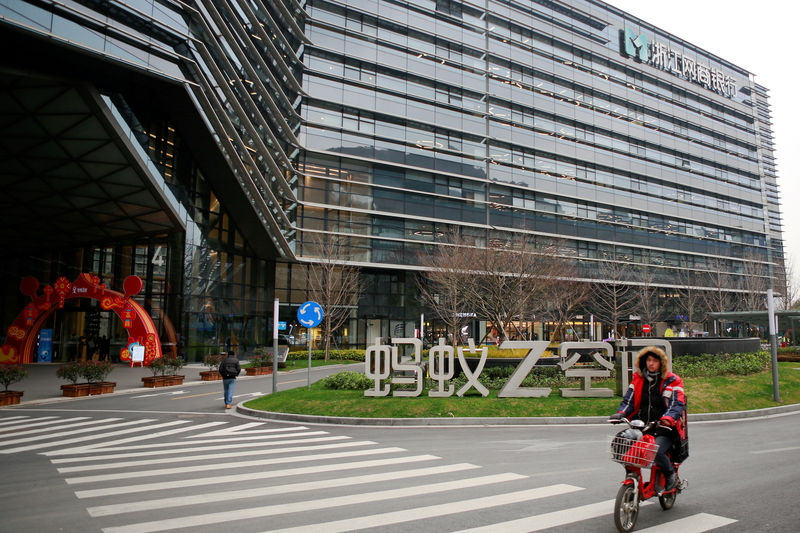By Alun John and Sumeet Chatterjee
HONG KONG (Reuters) - Asia's internet firms are challenging the region's traditional banks for consumer finances, tapping their massive user networks for business and following a trail blazed in China by tech giants Alibaba (NYSE:BABA) and Tencent.
The push into banking by companies better known for their messaging apps, cute emojis and online holiday bookings comes as regulators across Asia open up their banking sectors to a new breed of digital players.
The shift is in its infancy but contrasts sharply with the banking markets of Europe and North America, where change is slower and such startups tend to be backed by venture capital funds and financial sector incumbents, not tech firms.
Asia's tech entrants see their advantage in the way they can seamlessly integrate banking services with their users' regular online activities and the efficiency that comes from their technology.
"If you want to open a bank account (in Hong Kong) you need to go to a branch, answer questions for an hour, and you still won't get the account opened without follow up calls," said Wayne Xu, president of ZhongAn International, a unit of Chinese online insurer ZhongAn, setting up a virtual bank.
"However, all the information needed at the counter can already be collected on a mobile phone."
Hong Kong's banking regulator last month issued one of four so-called virtual banking licences to ZhongAn in what could be the biggest shake-up in years in a city dominated by HSBC and Standard Chartered (LON:STAN). Last week, the regulator said on it was making progress on four additional applications.
In South Korea, authorities have issued two online only bank licences, one of them to Kakao Bank in 2017, which is operated by the company behind the country's largest chat app.
"The 45 million monthly average users of our messaging app Kakao Talk is a huge plus for us when advertising our bank," a spokesman for Kakao Bank said. He added the bank uses Kakao's artificial intelligence technology for its automated customer support systems. The bank had 8.9 million users as of March.
Other Asian countries set to approve online-only banks include Taiwan – where a group led by a unit of Japanese messaging app operator Line Corp (NYSE:LN) has applied for a licence - and Malaysia, which plans guidelines by the end of the year. Bank of Thailand Governor Veerathai Santiprabhob said the central bank was exploring the issue.
"Large technology companies are seeing this as a land-grab opportunity where they can build out new sets of financial services that can be cross-sold to their existing users," said Jeff Galvin, a Hong Kong-based partner at McKinsey.
DIGITAL ASIA
Driving the shift in Asia is mobile technology's deep penetration across all aspects of consumer life.
Such trends were forged by Alibaba and Tencent in China where the two upended financial services and drove a revolution in the cashless economy with their digital payment applications.
In contrast, U.S. tech giants such as Amazon (NASDAQ:AMZN) and Alphabet (NASDAQ:GOOGL) Inc's Google have focused their financial industry efforts on providing tech and consulting services to incumbents.
Asian consumers are far more willing to bank with tech firms than elsewhere in the world.
More than 90 percent of consumers under 35 in China and India would bank with a technology firm, according to Bain research, compared to 75 percent in the United States and just 51 percent in France.
The online-only banks in Hong Kong plan to start-off by offering services such as savings accounts, credit cards, personal loans and travel insurance.
"What we are seeing in Asia is technology companies moving sideways into finance, inspired by or even threatened by the examples of Alibaba and Tencent," said James Lloyd, partner and APAC fintech leader at consultancy EY.
In Asia, the emergence of tech gains in the banking sector comes at a difficult time for the region's incumbents who have begun reassessing the vast branch networks that, until recently, were seen as their competitive advantage.
The number of bank branches in Hong Kong, Japan, Malaysia, South Korea and Thailand has declined in the last couple of years, dropping by between 1 percent and 7 percent in 2017 from 2015, according to the International Monetary Fund. That compares with growth of as much as 8 percent a decade ago.
To be sure, legacy banks in Asia have their own plans to stay relevant in the changing space with some tying up with new rivals.
Among the new Hong Kong digital banking licensees is a joint venture between StanChart, Chinese holiday booking giant Ctrip and local telco PCCW.
"We think that the ecosystem we can build together will be a great integration of lifestyle into banking," Mary Huen chief executive of StanChart Hong Kong, and chairman of the new virtual bank, said at a press conference.
